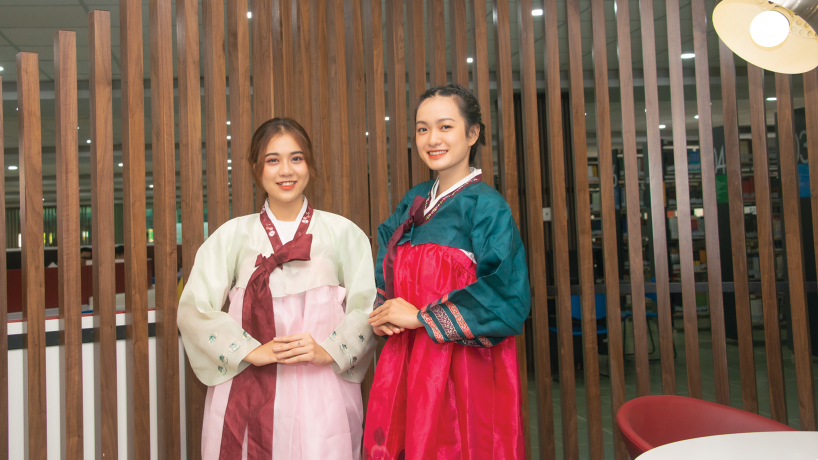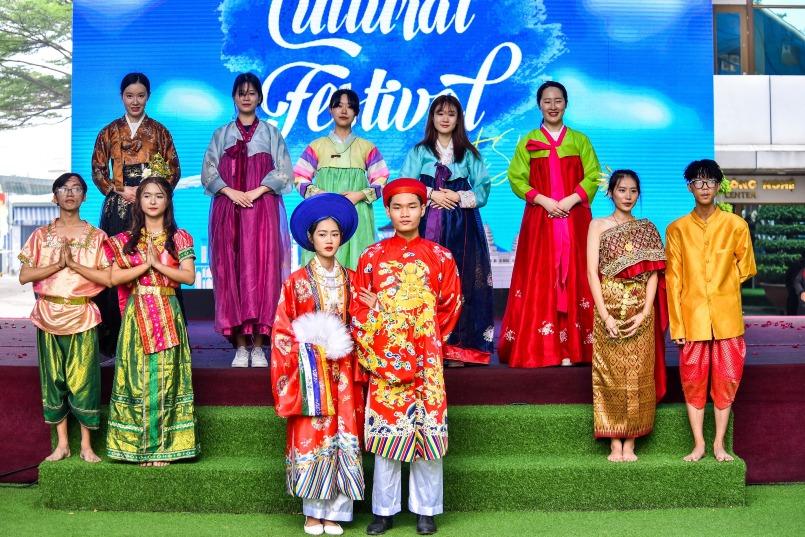Oriental Studies is the field of study focused on regions and nations. Pursuing this discipline is a journey into exploring the fascinating and mysterious world of the culture, society, economy, and people of Eastern countries – the cradle of ancient human civilization. Graduating in Oriental Studies opens doors to new achievements of modern Asian cultures, societies, and economies, including prominent nations like Japan and South Korea.
Major code
7310608
Enrollment combination
C00: Literature, History, Geography
C20: Literature, Geography, Civic Education
D01: Math, Literature, English
D15: Literature, Geography, English
Academic years
4 yearsDegree
Bachelor

Classroom learning, lectures, self-study, group work, presentations, project implementation, essay writing, etc.
Lecturing, role-playing, educational games, group activities, case studies and problem-solving, project-based learning.
A variety of assessment methods are applied, including assignments, oral exams, essays, tests, graduation project, and more.

DP70001 - Introduction to Oriental Studies (1)
DP70004 - Practical Vietnamese (1)
DP70003 - Linguistics Introduction (2)
CB70303 - Public Speaking Skills (1)
DP71101 - Japanese Grammar 1 (2)
DP71107 - Listening - Speaking Japanese 1 (3)
DP71113 - Reading - Writing Japanese 1 (3)
DP71119 - Geography and Population of Japan (2)
DP71201 - Korean Grammar 1 (2)
DP71207 - Listening - Speaking Korean 1 (3)
DP71213 - Reading - Writing Korean 1 (3)
DP71219 - Geography and Population of Korea (2)
CB70301 - Computer Science 1 (2)
CB71401 - Physical Education 1 - Swimming (*) (1)
CB70304 - Emotional Management Skills (1)
CB70101 - Marxist-Leninist Philosophy (3)
CB70204 - Logic (2)
DP70005 - History of Eastern Thought (2)
DP70002 - Vietnamese Cultural Foundations (2)
DP71102 - Japanese Grammar 2 (2)
DP71108 - Listening - Speaking Japanese 2 (3)
DP71114 - Reading - Writing Japanese 2 (3)
DP71202 - Korean Grammar 2 (2)
DP71208 - Listening - Speaking Korean 2 (3)
DP71214 - Reading - Writing Korean 2 (3)
TA70309 - English 1 (3)
CB70302 - Informatics 2 (2)
CB70305 - Communication Skills & Relationship Building (2)
CB70106 - General Law (2)
CB70102 - Marxist-Leninist Political Economy (2)
CB71403 - Physical Education 2 * (1)
CB71101 - Environment and PTBV (2)
CB71102 - Behavioral Psychology (2)
CB71103 - Medical Ethics Psychology (2)
DP71103 - Japanese Grammar 3 (2)
DP71109 - Japanese Listening and Speaking 3 (3)
DP71115 - Japanese Reading and Writing 3 (3)
DP71203 - Korean Grammar 3 (2)
DP71209 - Korean Listening and Speaking 3 (3)
DP71215 - Korean Reading and Writing 3 (3)
TA70310 - English 2 (3)
CB70306 - Negotiation and Bargaining Skills (2)
CB70103 - Scientific Socialism (2)
DP70006 - Sociology (2)
CB71408 - Physical Education 3 (choose 1/4 subjects)* (1)
CB71104 - Green Economy and Sustainable Development (2)
CB71105 - Vietnamese Folk Culture and Music (2)
CB71106 - History of World Civilization (2)
DD70039 - First Aid Practice (2)
DP71104 - Japanese Grammar 4 (2)
DP71110 - Listening - Speaking Japanese 4 (3)
DP71116 - Reading - Writing Japanese 4 (3)
DP71121 - Japanese People and Culture (2)
DP71204 - Korean Grammar 4 (2)
DP71210 - Listening - Speaking Korean 4 (3)
DP71216 - Reading - Writing Korean 4 (3)
DP71221 - Korean People and Culture (2)
TA70311 - English 3 (3)
CB70104 - Ho Chi Minh Thought (2)
CB70105 - History of the Communist Party of Vietnam (2)
CB70206 - Scientific Research Methods (2)
DP71105 - Japanese Grammar 5 (2)
DP71111 - Listening - Speaking Japanese 5 (3)
DP71117 - Reading - Writing Japanese 5 (3)
DP71122 - Japanese Economy (2)
DP71205 - Korean Grammar 5 (2)
DP71211 - Listening - Speaking Korean 5 (3)
DP71217 - Reading - Writing Korean 5 (3)
DP71222 - Korean Economy (2)
DP71120 - Japanese History (2)
DP71220 - Korean History (2)
DP70008 - Foreign Language Teaching Methods (3)
DP70007 - International Relations (2)
DP71106 - Japanese Grammar 6 (2)
DP71112 - Japanese Listening and Speaking 6 (2)
DP71118 - Japanese Reading and Writing 6 (2)
DP71123 - Japanese Foreign Policy (2)
DP71124 - Japanese Literature (2)
DP71206 - Korean Grammar 6 (2)
DP71212 - Korean Listening and Speaking 6 (2)
DP71218 - Korean Reading and Writing 6 (2)
DP71223 - Korean Foreign Policy (2)
DP71224 - Korean Literature (2)
TA71312 - English 4 (2)
DP71125 - Proficiency Test JLPT (2)
DP71225 - TOPIKz Proficiency Test (2)
DP70009 - Graduation Internship (4)
Students choose 1 of 2 options:
(1) DP71001 - Graduation Thesis (6)
(2) Elective: (choose 2/4 subjects)
DP71126 - Vietnamese - Japanese Translation (3)
DP71127 - Business Japanese (3)
DP71226 - Vietnamese - Korean Translation (3)
DP71227 - Business Korean (3)
After graduation, students can take on the following positions:
For over two decades, Dong Nai Technology University (DNTU) has grown and developed with the steadfast belief that "Talented and virtuous individuals are the vital essence of a nation.". Our mission is to educate high-quality human resources through technology-based training and experiential learning. We are dedicated to conducting applied research and transferring knowledge to meet societal needs, embrace international integration, and foster sustainable development. DNTU takes pride in cultivating digital citizens who are prepared to embrace the future with confidence.